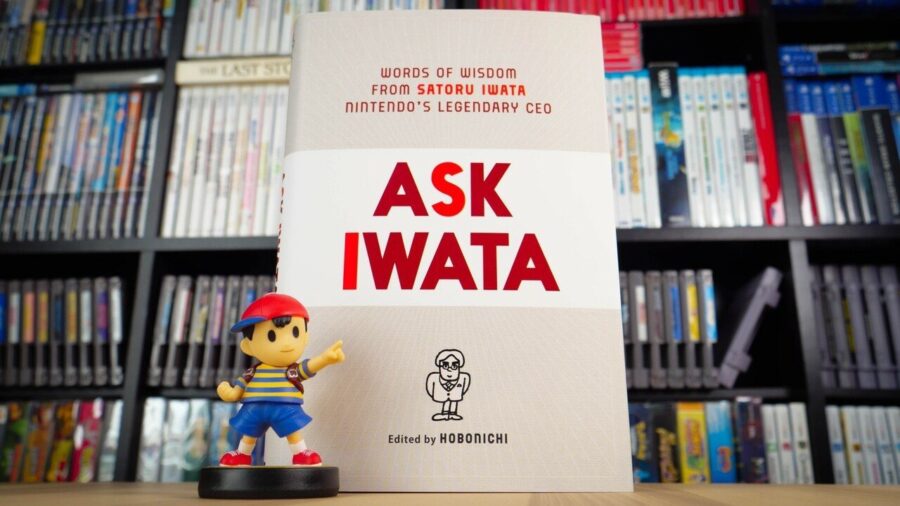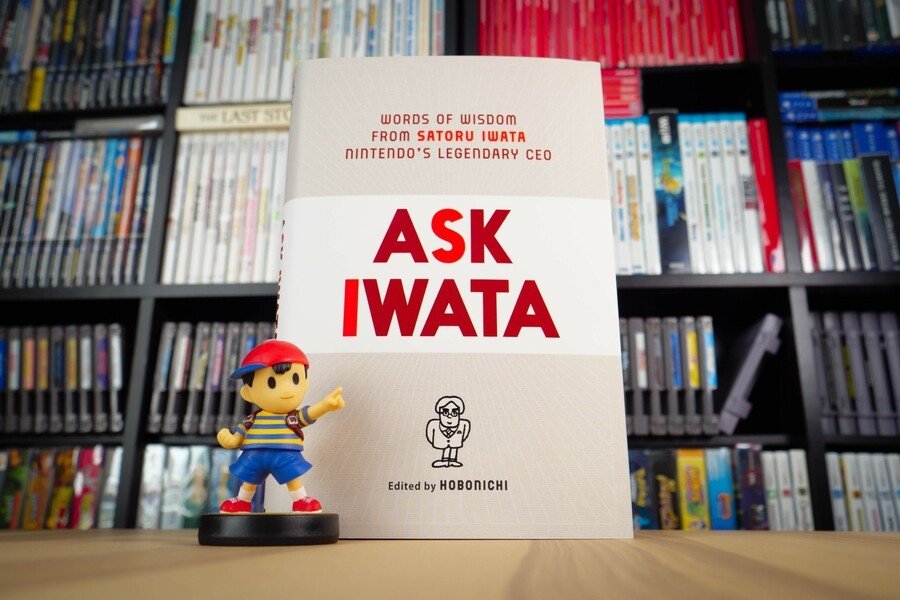This book review was originally published on 17th April, and we’ve republished it on 11th July 2024, marking six years since Satoru Iwata passed away.
It’s been said often that Satoru Iwata wasn’t just a CEO of a hugely successful company, he was far more. That sentiment is frequently connected to his various iconic public appearances, but more depth could be found in translations of his excellent Iwata Asks interviews and, for Japanese readers, on the Hobo Nikkan Itoi Shinbun website. This book — Ask Iwata: Words of Wisdom from Satoru Iwata, Nintendo’s Legendary CEO — is largely a skilfully translated compilation of those sources, along with touching words from Iwata’s colleagues and friends, Shigeru Miyamoto and Shigesato Itoi.
Structurally, the majority of this book is the words of Iwata himself, or those transcribed from conversations with Itoi or Iwata Asks. It’s true that some readers may have already digested these details already, but the book does a good job of leading between themes and times in Iwata’s life.
His own words on his youth and love for programming shine through, and the tale of the remarkable origins of HAL Laboratories is an early stand-out. Given his impressive resumé, it’s easy to overlook the fact that Satoru Iwata was an extremely skilful programmer, and even in his days as an executive he’d be parachuted in to rescue projects. For fans of EarthBound, in particular, there are wonderful sections that recount the way Iwata blended his skill and personality to not only revive the project, but the team itself.
There are snippets in here about game and hardware design, naturally, and though they are interesting, they are ground that’s been covered before. The standout segments revolve around Iwata writing about more generalised topics. Though he is often talking about running a company or Nintendo’s philosophies, his words are really about people and how to lead fulfilling lives. That sounds lofty, but it’s also grounded in the telling; it’s no surprise that the book’s publisher has opted for ‘motivational’ and ‘management’ genres when listing the book.
Yet this isn’t a self-help book or a patronising motivational screed telling you to ‘just do it’. Iwata’s qualities as a person — recounted by those that knew him best — seemingly filtered through his entire work life. In fact, reading Iwata’s principles in this form explain some of Nintendo’s more confusing decisions in his era as President, and make them seem right, even if the market disagreed.
The recurring theme is that Iwata was interested in people, and in their happiness, from employees to customers. Some of the most revealing lines include those that state he was less interested in what technology could do, but what it couldn’t; what is it that people can do that makes them unique, and how can that be brought out? It’s extraordinary that a practice he started at HAL, of having annual face-to-face meetings with every employee in the company, continued even at Nintendo. His goal was to learn about people, improving his own understanding while striving to help each individual find fulfilment in their work.
It’s extraordinary that a practice he started at HAL, of having annual face-to-face meetings with every employee in the company, continued even at Nintendo.
In the Iwata era, you could analyse the company’s successes and failures, but the word that often came up was ‘unique’. This book helps to explain how that wasn’t an accident, but was a combination of the ethos of innovation from Iwata’s predecessor, Hiroshi Yamauchi, and his own belief in the value of making happiness a core part of a corporation’s thinking. He acknowledges that more formal thinking occurs in business, but he strove to keep cynicism at bay. When you reflect on products like DS and Wii, and how they transformed the gaming landscape, that shines through.
This book, in its own way, also shines a light on Shigeru Miyamoto. Iwata described himself as Miyamoto’s “number one follower”, and his logical deconstruction of how Miyamoto works and why it’s led to such extraordinary success is eye-opening. It also reinforces something Miyamoto says about Iwata in the book: that he had peerless perception and understanding through his observations.
Iwata also wrote about the inevitability of failures in life and business alike, including a fascinating section on becoming president of HAL as it wrestled with monstrous debt. The book doesn’t address the 3DS and Wii U period in any depth, likely as a result of Iwata’s illness and challenges in his later years. That in itself would have been fascinating, but events of that time do come into sharp focus within the context of the book. An example is Iwata’s humility in apologising and taking a sizeable pay-cut when slashing the price of the 3DS so early, a move that undoubtedly helped to save the system.

With Wii U, it was never saved in terms of its commercial performance, but it’s also clear that the idea behind the system then informed and inspired the Nintendo Switch, a incredibly successful console considered by many as the legacy of Iwata’s leadership, instinct and philosophy. Iwata writes eloquently about maintaining faith and togetherness in failure, and likewise remaining grounded and seeking to innovate despite extraordinary highs. As Miyamoto himself says, Iwata established systems and approaches in Nintendo that endure and inspire the next generation.
Iwata’s unique characteristics, vision and purity explain why Hiroshi Yamauchi, when choosing a successor outside his family, opted for a fresh-faced HAL President only in his early 40s
Yet, there’s sadness in reading the book, not just because they are the words of a much admired and loved man who left us far too soon, but because it is debatable whether a major company CEO like him will ever come again. Some may be better business people, some may be wiser and more effective at selling products, but Iwata’s unique characteristics, vision and purity explain why Hiroshi Yamauchi, when choosing a successor outside his family, opted for a fresh-faced HAL President only in his early 40s. Iwata had unique strengths, and Yamauchi had the vision to trust in them.
Perhaps we’ll never see someone like Iwata as CEO of a major company again; it’s possible he truly was one of a kind. Regardless, this is a book that should be read by all — not just Nintendo fans, or video game fans — simply because Iwata espoused an attitude and outlook on the world that put happiness above all else, even when it was an aspiration in tough times. He wouldn’t always succeed, as no-one does, but he’d keep trying. In a world that can often be cynical, his outlook is a welcome and hopeful beacon.
That’s why Iwata’s Nintendo, from giddying highs to some genuine lows, stood out and brought smiles to so many faces. That was Iwata’s humble goal all along.
Please note that some external links on this page are affiliate links, which means if you click them and make a purchase we may receive a small percentage of the sale. Please read our FTC Disclosure for more information.
Nintendo Life | Latest Updates
Source link
Related Post:
- Leadership lessons from Satoru Iwata
- Satoru Gojo ARTFX Figure Shows Off His Hollow Purple Technique
- Nintendo Revives Its Developer Interview Series, Formerly Known As Iwata Asks
- Three random words are still one of the best passwords, experts say
- Mythic Ocean Reminds Us of the Power of Our Words
- A Memoir Blue tells a moving story completely without words – PlayStation.Blog
- A Memoir Blue Is an Interactive Poem Devoid of Words, Hitting PS5 and PS4
- Words with Friends partners with Lady Gaga’s Born This Way Foundation for #BeKind2023 campaign | Articles
- Ask Us Anything: Submit Your Questions For Our Next Issue
- Ask Us Anything: Submit Your Questions For Our Next Issue


